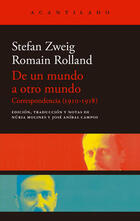In November 1914, after the outbreak of the First World War, Stefan Zweig noted in his Diaries: "I had to write to Romain Rolland; I needed to unburden myself to a friend. No one here understands me: they lack the firm will to be fair." And it was precisely this heightened sense of justice, as well as his fervent defense of pacifism and humanist ideals, that united the future French Nobel Prize winner with his most faithful Austrian disciple. Both spoke out publicly against the war, denouncing in their letters fake news, hatred between nations, and the selfishness of those who remain silent. This correspondence, written by two kindred spirits from two warring countries, is an exceptional testimony to the catastrophe of the Great War and to the fervent desire of two of the most lucid writers of the first half of the 20th century to build a united Europe based on fraternity among peoples.
Shopping cart
Loading cart
Important notices
|
|
Recordando a André Rouillé: Su legado en la fotografía André Rouillé 1948 - 2025 |
|
|
Libros de filosofía y co. Disponibles en Librería Herder |
|
|
Revista Filosofía & Co. nº 9 Nueva revista de filosofia divulgativa y actualidad |
|
|
"Espacios de la filosofía" - Mauricio Beuchot - Novedad Herder México |
|
|
Revista Filosofía & Co. nº 8 Nueva revista de filosofia divulgativa y actualidad |
Pay safely with:


In the webshop
New
|
|
La Peste Negra, 1346-1353 69776 $599.00 -15.00% $509.15 |
|
|
El nacimiento del purgatorio 69775 $729.00 -15.00% $619.65 |
|
|
Breve historia del conflicto entre Israel y Palestina 69487 $289.00 -15.00% $245.65 |
|
|
Jaques Derrida, el excéntrico 69901 $1,200.00 -0.00% $1,200.00 |
|
|
Las obras del amor 69912 $700.00 -0.00% $700.00 |
In the press
Promotions
|
|
Catolicismo: Historia y Doctrina 20117 $1,200.00 -50.00% $600.00 |
|
|
Basiswörterbuch 28205 $390.00 -50.00% $195.00 |
|
|
Manual de la Biblia 20641 $2,410.00 -50.00% $1,205.00 |
|
|
Panorama B1.2 Curso 46507 $235.00 -35.00% $152.75 |
|
|
Panorama A1 Ejercicios. Ubungsbuch 39886 $395.00 -37.00% $248.85 |





